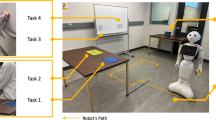Abstract
Social robots are expected to assist us soon in our everyday lives, but they may not be able to meet individuals’ needs without the ability of learning new skills from humans. In a realistic setting such as a home environment, users may not be familiar with how to teach new tasks to a robot. Here, we ask whether it is possible for people without the experience of teaching a robot to become more proficient in doing so through repeated interaction. We show results of a study, where twenty-eight participants, who had never interacted with human-like robots, experienced teaching a set of physical cleaning tasks to a humanoid robot over five sessions. We report significant improvements in the success of kinesthetic teaching over time for some tasks. We also show improvements in the teaching speed over time. The results suggest that by gaining experience in kinesthetic teaching of domestic tasks to a robot over time, without any formal training or external intervention and feedback, non-experts can become more effective robot teachers.
This research was undertaken, in part, thanks to funding from the Canada 150 Research Chairs Program. The authors wish to thank Delara Forghani for providing assistance with data encoding.
Access this chapter
Tax calculation will be finalised at checkout
Purchases are for personal use only
Similar content being viewed by others
References
Aliasghari, P., Ghafurian, M., Nehaniv, C.L., Dautenhahn, K.: Impact of nonverbal robot behaviour on human teachers’ perceptions of a learner robot. Interact. Stud. 22(2), 141–176 (2021)
Argall, B.D., Chernova, S., Veloso, M., Browning, B.: A survey of robot learning from demonstration. Robot. Autonom. Syst. 57(5), 469–483 (2009)
Billard, A., Calinon, S., Dillmann, R., Schaal, S.: Robot programming by demonstration. In: Siciliano, B., Khatib, O. (eds.) Springer Handbook of Robotics, pp. 1371–1394. Springer, Berlin (2008). https://doi.org/10.1007/978-3-540-30301-5_60
Bills, A.G.: General experimental psychology. Longmans, Green and Co (1934)
Breazeal, C.: Role of expressive behaviour for robots that learn from people. Philos. Trans. R. Soc. Biol. Sci. 364, 3527–3538 (2009)
Cakmak, M., Takayama, L.: Teaching people how to teach robots: the effect of instructional materials and dialog design. In: Proceedings of the 2014 ACM/IEEE International Conference on Human-Robot Interaction, pp. 431–438 (2014)
Cakmak, M., Thomaz, A.L.: Eliciting good teaching from humans for machine learners. Artif. Intell. 217, 198–215 (2014)
Fink, J., Bauwens, V., Kaplan, F., Dillenbourg, P.: Living with a vacuum cleaning robot. Int. J. Soc. Robot. 5, 389–408 (2013)
Fischer, K., et al.: A comparison of types of robot control for programming by demonstration. In: 2016 11th ACM/IEEE International Conference on Human-Robot Interaction (HRI), pp. 213–220 (2016)
Grollman, D.H., Billard, A.: Donut as I do: learning from failed demonstrations. In: 2011 IEEE International Conference on Robotics and Automation, pp. 3804–3809 (2011)
Kaiser, M., Friedrich, H., Dillmann, U.: Obtaining good performance from a bad teacher. In: Programming by Demonstration vs. Learning from Examples Workshop at ML 1995 (1995)
Ravichandar, H., Polydoros, A.S., Chernova, S., Billard, A.: Recent advances in robot learning from demonstration. Ann. Rev. Control Robot. Autonom. Syst. 3(1), 297–330 (2020)
Sakr, M., Freeman, M., Van der Loos, H.F.M., Croft, E.: Training human teacher to improve robot learning from demonstration: a pilot study on kinesthetic teaching. In: 2020 29th IEEE International Conference on Robot and Human Interactive Communication (RO-MAN), pp. 800–806 (2020)
Saunders, J., Nehaniv, C.L., Dautenhahn, K., Alissandrakis, A.: Self-imitation and environmental scaffolding for robot teaching. Int. J. Adv. Robot. Syst. 4(1), 109–124 (2007)
Tanwani, A.K., Mor, N., Kubiatowicz, J., Gonzalez, J.E., Goldberg, K.: A fog robotics approach to deep robot learning: application to object recognition and grasp planning in surface decluttering. In: 2019 International Conference on Robotics and Automation (ICRA), pp. 4559–4566 (2019)
Weir, J.P.: Quantifying test-retest reliability using the intraclass correlation coefficient and the SEM. J. Strength Conditioning Res. 19(1), 231–240 (2005)
Author information
Authors and Affiliations
Corresponding author
Editor information
Editors and Affiliations
Rights and permissions
Copyright information
© 2022 The Author(s), under exclusive license to Springer Nature Switzerland AG
About this paper
Cite this paper
Aliasghari, P., Ghafurian, M., Nehaniv, C.L., Dautenhahn, K. (2022). Kinesthetic Teaching of a Robot over Multiple Sessions: Impacts on Speed and Success. In: Cavallo, F., et al. Social Robotics. ICSR 2022. Lecture Notes in Computer Science(), vol 13818. Springer, Cham. https://doi.org/10.1007/978-3-031-24670-8_15
Download citation
DOI: https://doi.org/10.1007/978-3-031-24670-8_15
Published:
Publisher Name: Springer, Cham
Print ISBN: 978-3-031-24669-2
Online ISBN: 978-3-031-24670-8
eBook Packages: Computer ScienceComputer Science (R0)




